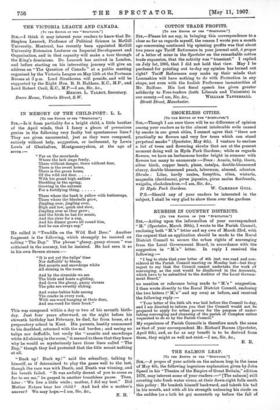IN MEMORY OF THE CHILD-POET L. L. rTo TEM EDITOR
OF THE "SPECTATOIL".1
Siu,—Is it from partiality for a bright child, a little brother of the April winds, that I fancy a gleam of precocious genius in the following very faulty but spontaneous lines P They are given uncorrected, just as they were composed, entirely without help, suggestion, or incitement, by Lewis Lewis of Glenhafren, Montgomeryshire, at the age of seven :— "Far on the moorlands Where the lark sings freely, There without danger, there without fear, There is the sweet home, There is the green home, Of the wild red deer With his grand high antlers Shedding in the spring, Growing in the autumn For a fortifying thing There where the bank is yellow with buttercups, There where the bluebells grow, Jingling ever, jingling ever, High and low, quick and slow, Jingling ever as they grow ; And the birds he has for music, And the river for a cup, And his dinner grows all round him,
And he can always sup."
He called it "Twaddle on the Wild Red Deer." Another fragment is the following, which strangely, be insisted on calling " The Day." The phrase " glassy, gauzy stream " was criticised in the nursery, but he insisted. He had seen it so in'his own Severn stream :— " It is not yet the tulips' time Nor daffodils' to bloom,
But aconite and snowdrops white All shining in the room.
And by the riverside we see The birds and boats a-gliding, And down the glassy, gauzy stream The pike are sweetly sliding.
And water-babies hide among The cracks in every rock,
With sea-weed hanging at their door, And sea-weed for their frock."
This was composed within a day or two of his seventh birth- day. Just four years afterward, on the night before his eleventh birthday last February, he died, far from home, at a preparatory school in Kent. His parents, hastily summoned to his deathbed, returned with the sad burden ; and seeing no tulips nor daffodils, but verily the "aconite and snowdrops white All shining in the room," it seemed to them that they knew why he would so mysteriously have those lines called " The Day," though they had protested that the title meant nothing at all.
"Buck up! Buck up!" said the schoolboy, talking to himself, as if determined to play the game well to the last, though the race was with Death, and Death was winning, and his breath failed. " It was awfully decent of you to come so far to see me," he gasped in another breathless pause. Then, later " We live a little while ; mother, I did my best." Did Mother Nature hear her child ? And had she a mother's answer? We may hope.—I am, Sir, &c.,
N. H.










































 Previous page
Previous page